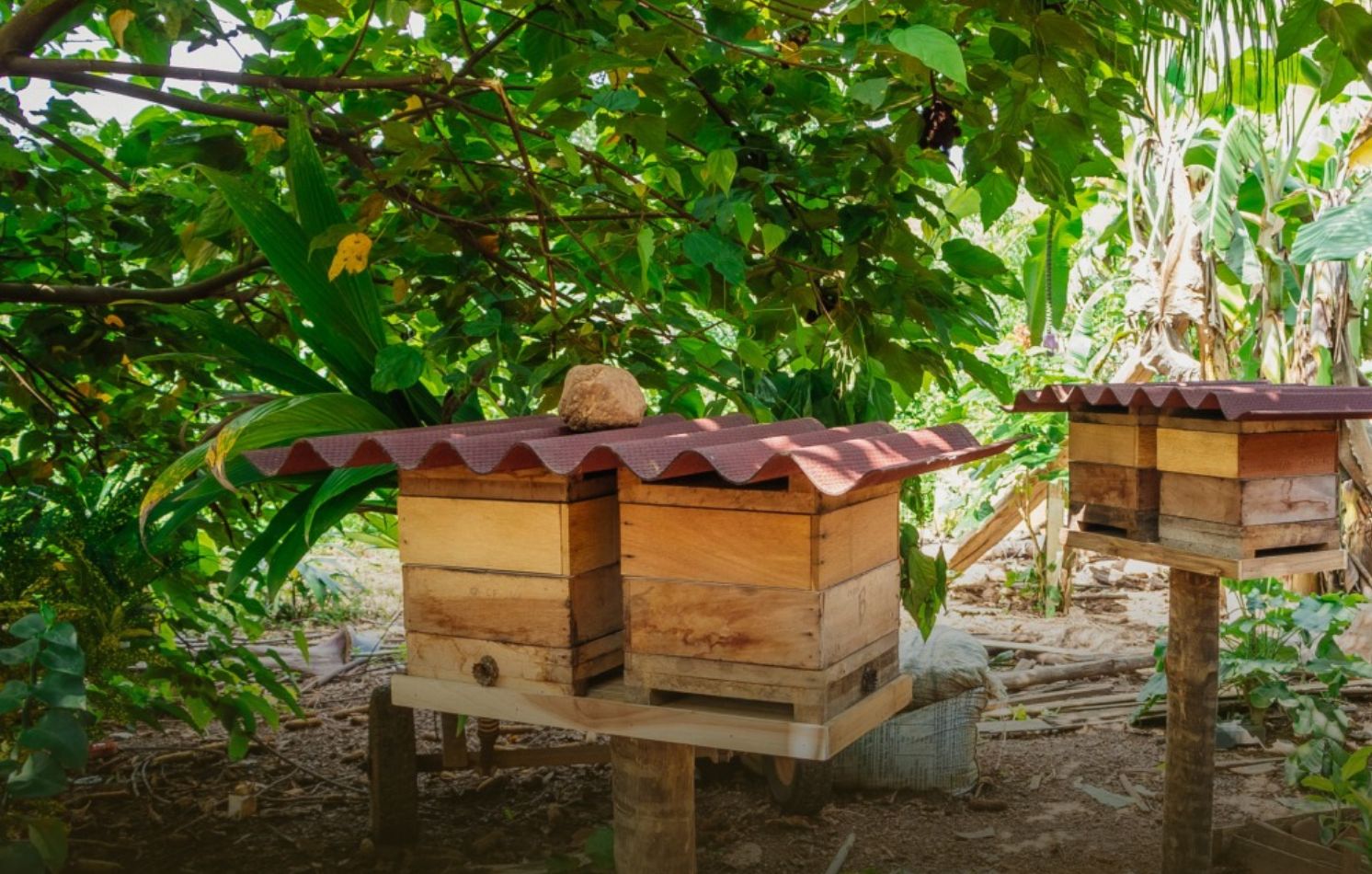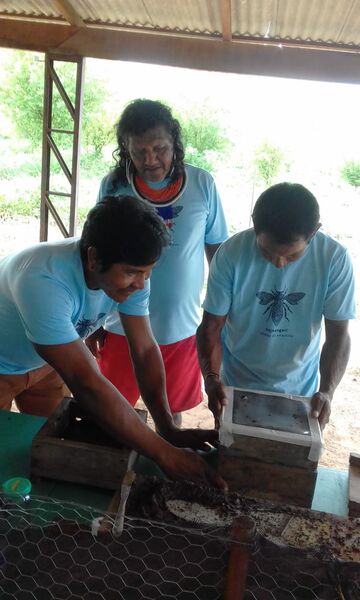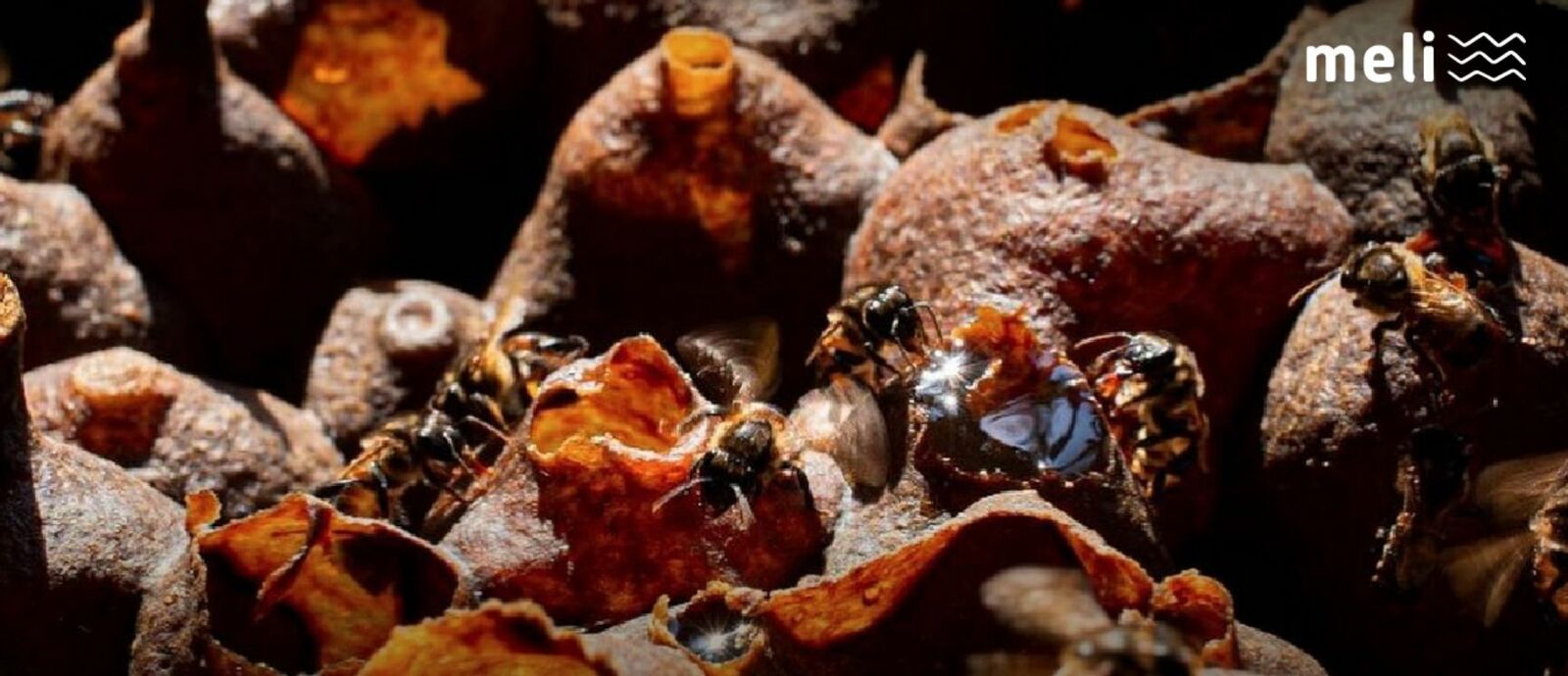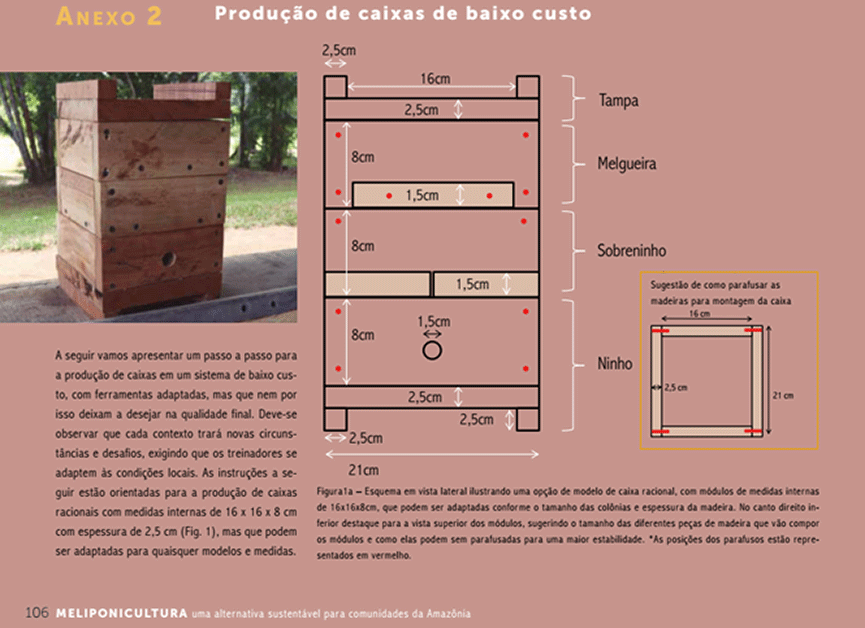Native beekeeping in the Amazon rainforest

As I interviewed Meli Bees founder Ana de Lima I found myself staying curious about the native beekeeping workshops, so Ana forwarded two contacts of her research partners to me and I shot them some questions.
Christoph Grueter is a Swiss behavioural ecologist with an interest in social insects, mainly bees. He leads a research group at the University of Bristol in the UK that studies honeybees in England and stingless bees in Brazil. Lilian Caesar is a researcher at the University of Bristol on genetics of native bees in Brazil.

Humintech: Welcome Lilian Caesar and Christoph Grueter, thank you for taking the time.
Christoph Grueter: sure, I might not be able to answer all the questions but am happy to try answer some.
Humintech: What does native beekeeping of stingless bees in the Amazon rainforest include?
Is it similar to European beekeeping where the keeper builds boxes, treats them against parasites, takes their products and feeds them substitutes?
Lilian Caesar: Native beekeeping involves the management of colonies of "domesticated native stingless bee species”, those we can manage in boxes. This may also include building or buying boxes with proper wood and architecture according to the species that will live in the box, offering food supplements (eg., syrup and pollen) and extract hive products (eg., honey and propolis).
Native beekeepers may also adopt strategies to protect their colonies from parasites, such as traps. However, native beekeeping does not include protecting native bees in their wild nests, but can help to popularize native bees and raise knowledge about them, and therefore increase the interest in protecting the natural populations as well.
Christoph Grueter: There are actually practices to protect stingless bees against predatory parasitic bees, ants or Phoridae flies. Those range from destroying nests to setting traps like a bowl of vinegar for the flies. The most important thing is certainly the construction and smart placement of the boxes – ants live stationary so choosing a safe place for the box is vital and predatory insects that are bigger than bees can be kept out with small entrances.
Humintech: In Europe, beekeeping sometimes involves keeping their boxes in the fridge or cellar to protect them from hatching too early only because of some warm days in February. Are there methods to help native bees with their "timing" of hatching, breeding, nesting in the Amazon as well? (obviously there is no frost/cold season)
Christoph Grueter: I don’t know of any methods to influence the stingless bee’s hatching in the Amazon. Unlike our bees, which are inactive in winter, the bees in the Amazon are active for 12 months and the queen lays eggs for 12 months as well (even if the activity varies somewhat).
Lilian Caesar: Surely these practices are applied with good intentions by the beekeepers. However, any artificial practices will only mask bigger problems (eg, climate change affecting the colony cycle, development issues…), and are not sustainable for beekeepers over the years, or for the ones that have several colonies. I don't know of any practices in the Amazon to control the timing of bees. But in southern Brazil, where it is cold in the winter, beekeepers sometimes use heaters to keep colonies more active during the winter – a practice normally applied with colonies of species not native to the region, therefore a bad practice in many ways.
Humintech: Have you been able to classify certain parameters that affect the relationship between bees and parasites?
Lilian Caesar: Yes, in my PhD thesis – studying an annual syndrome affecting a native stingless bee – I showed that both the genetics of the colony and environmental factors can contribute to colony failures. For example, a weaker immune response and nutritional stress can make it difficult for the bees to deal with constant parasite threats.
Besides my own research, there are numerous studies showing that pesticides, changes in the microbiota, poor diet and other stressors impact the response of bees to parasites.
Christoph Grueter: Colony size is also a very important factor in the relationship between bees and their parasites, as I see it. Large colonies have few problems with Phoridae and many other parasites, while small colonies are much more vulnerable. Also, parasitic bees seem to have a preference for colonies with particularly sweet honey (higher sugar content).

Humintech: If I may ask a question: why are large colonies better protected against parasites? I expected the opposite, that high populations are more weakened by density.
Christoph Grueter: I think that large colonies can cope with a partial loss of workers more easily than small colonies. Larger colonies also have more workers who can do repair work or remove parasitic larvae, e.g. fly or beetle larvae. But you are also right: the population density of colonies in an area may also play a role. If a high density leads to the weakening of individual colonies, e.g. through food competition, then this could become an advantage for parasites and predators.
Humintech: Do the communities in the Amazon also plant specific plants to help them thrive or to repel predators like bigger insects? How do the boxes/nests look like, what is important?
Lilian Caesar: Native beekeepers who have their meliponaries in conserved areas do not tend to plant additional flowers because it is not needed. But other beekeepers in less conserved areas do plant more flowers to guarantee a better nutrition (although this is not as good as the natural and varied vegetation/flowers, as shown in the scientific literature). On the other hand it also assures there is less competition for pollen and overlap of pollinators that could share parasites. I don’t know of beekeepers who plant specific flowers to repel predators.
Christoph Grueter: There are different designs of boxes, a common one is shown below (from the book "Meliponicultura" by Ayrton Vollet-Neto). The box should offer good protection against enemies and elements, but at the same time be modular so that the beekeeper has good access to the brood (lower room) and the honey pots (upper room).

Figure 1: From the book "Meliponicultura" by Ayrton Vollet-Neto
Humintech: What are, in your professional opinion, the most important acts to improve the bees health?
Lilian Cesar: Conserve and recover native forests, where bees will be able to nest (throughout evolution bees evolve to have nests that protect them from parasites to predators) and have a good nutrition (with varied pollen, fortifying the immune response, reducing competition with other pollinators, and reducing the exchange of pathogens). Also, give instruction and support to native beekeepers, especially those who manage species no longer found in nature.
Christoph Grueter: I agree. The biggest threat to stingless bees is habitat loss and, probably, pesticides; they can cope with the other risks.
Humintech: Is there a significant difference healthwise in how often the products (honey, polen, propolis) are being taken?
Lilian Cesar: Yes. All colony products are actually produced because the bees need them for nutrition and protection. If we extract too much, the bees have no stocks for them, weakening the colony which becomes more susceptible to stressors (pesticides, parasites...), or causing the colony to collapse. Finally, the beekeeper also runs out of products (or ends us with a poorer quality product), or loses the colony. Thus, over extracting is bad for both bees and beekeeper.
Humintech: Thank you for your time and effort! It was a pleasure.
All those questions and many more are being answered in Meli Bees workshops in native beekeeping and regenerative agroforestry in the Amazon rainforest. Read more about here.

